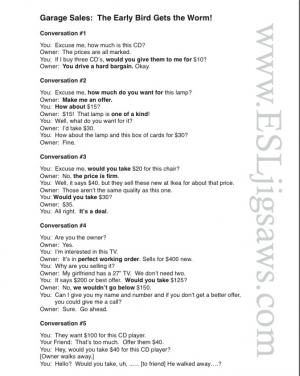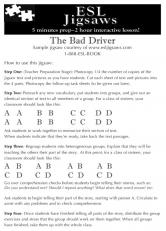ESL Jigsaws
5 Minutes Prep - 2 Hour Interactive Lesson!
Soft Skills: Bargaining
Bargaining (or haggling) takes place all over the world. North Americans often think of it as restricted to places like flea markets or garage sales, when in fact bargaining takes place in a wide variety of business transactions. Think of the negotiation involved in the purchase of expensive items, such as cars or real estate.
One of the challenges in adjusting to a new culture is cracking the cultural code on when and how, or often how soon, to bargain. This topic is rife with opportunities to teach soft skills, the skills beyond language that are so needed for successful social interactions in a culture.
Students from other cultures often overlook the importance in North America of the brief exchange of pleasantries before launching into negotiations. This kind of language exchange is referred to as the phatic function. Phatic language doesn’t really convey any information. Its function is social. In a garage sale setting, it might involve talking about the weather. In a more hectic setting, it might be reduced simply to saying “hi”, but without it, in North America, the transaction is less likely to satisfy both parties and may result in negative first impressions.
Another notable difference between North America and some other countries seems to be in the way North Americans will often start the creating value stage of the transaction. Take a look at this interaction from the excellent video Linc 2:19 Buying a Used Bicycle:

Notice how Tasha begins the creating value stage of the transaction by complimenting Luigi on the bike. Over the years, I’ve had numerous students tell me how different this is from their own cultures where a criticism of the item would more likely be the way to start negotiations.
Staging a garage sale in your classroom is a great way to practice the idioms related to haggling as well as important soft skills.
I’ve created a dialog sheet for conversation practice with a variety of common bargaining idioms for beginner or intermediate ESL or EFL students to practice. You are welcome to download this free handout for use in your own classroom. Clicking on the image below will enable you to view the PDF large on your screen and then print it if you want.
Post your comment
Comments
-
Great worksheet, I find it very useful on my conversation classes:) Thank U very much
Posted by anette, 12/11/2015 10:16am (4 years ago)
-
Wow, I'm really impressed, Nancy! Really good article. I didn't even know you had this blog before.
Posted by Alison C., 26/06/2012 2:47am (7 years ago)
RSS feed for comments on this page | RSS feed for all comments



